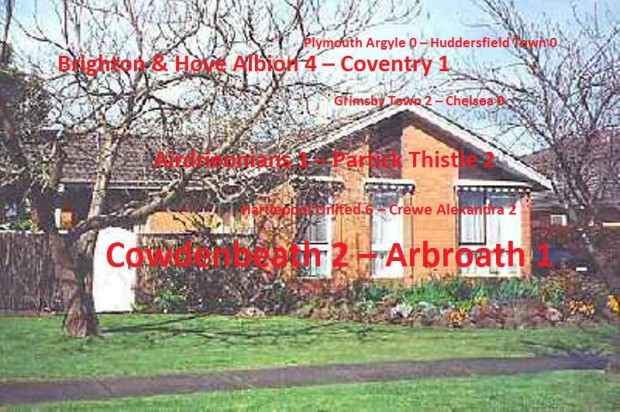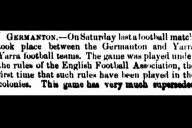Certain memories act as anchors to your childhood. Little boats bobbing up and down in a harbour, the sea rising and falling with the tides, the anchors keeping those little boats from drifting out to the big, blue sea.
BBC broadcaster James Alexander Gordon provides a little anchor to one of those ritual memories from childhood: spending Sundays at the football with my father.
Gordon passed away just last month on August 18, only about a year after retiring at the age of 77 as the BBC football results reader.
Brighton & Hove Albion 4 – Coventry 0
On Sundays, my father would take me to a football match. Sometimes we would go to a National Soccer League match, other times we would go to a State League match. It was a rare weekend during the football season when we didn’t go to a match. This was on top of me playing junior football on Saturdays.
Grimsby Town 2 – Chelsea 0
Kick-off was almost always, from memory, at 3pm. The match would finish at about 4.45pm and after the match we’d often get a bite to eat. Sometimes it would be at Leo’s Spaghetti Bar on Fitzroy St, or a pizza joint on Glen Huntly Rd, or maybe just a burger joint along Nepean Hwy. It was all part of the ritual. We would talk about the match as we ate: who played well, who didn’t; why the referee did or didn’t give a penalty; what the result meant for the team’s standing on the ladder.
Plymouth Argyle 0 – Huddersfield Town 0
Football has always been like a religion for my father. The missionaries of this religion, those who brought the game to his homeland of Hungary, were British. They were men like Jimmy Hogan, the English coach who imparted his football know-how to Mitteleuropa in the 1910s, coaching teams in Austria, Hungary and Switzerland. Hogan planted the seeds of the football revolution that would overthrow the supremacy of his homeland as the world’s premier football power. When Hungary famously beat England 6-3 at Wembley in 1953, Hungarian coach, Gusztav Sebes, said: “We played football as Jimmy Hogan taught us. When our football history is told, his name should be written in gold letters.” British football was still seen as the gold standard in those days.
Hartlepool United 6 – Crewe Alexandra 2
It was important we were in the car with the radio on at 6pm to hear the man from the BBC, James Alexander Gordon, read the classified football results of that weekend’s round of English and Scottish league matches. This was well before the internet and its swamp of information would make results instantaneously known, with the minutiae of each match pored over in a thousand tweets and blogs. Unless you wanted to wait for the newspaper the next day, listening to the smooth, reassuring tones of Gordon was the way you found out how your team had fared. But even more than that, the way he read the results was like a rosary recital, an incantation opening up the vast hinterland of British football at a time when it still held an ancien regime mystique.
Airdrieonians 1 – Partick Thistle 2
Listening to Gordon read the results as we sat in the car instantly transported me to another world. As a young boy infatuated with football, the dulcet tones of Gordon reading out the names of these exotic teams hailing from obscure towns in Britain fired my imagination: Crewe Alexandra, Hamilton Academical, Queen of the South, West Bromwich Albion, Halifax Town, Stenhousemuir, and on it would go, from Plymouth Argyle in the south all the way to Elgin City in the north.
Cowdenbeath 2 – Arbroath 1
Often we would listen to Gordon, all the way through to the last result for Scottish Division 2, as my dad pulled into the taxi depot, where he would drop off our car and pick up his cab for the night. Listening to Gordon read those results signalled the end of another weekend of football. After picking up the cab, my dad would drop me home and pull an evening shift, before getting home for a few hours of sleep and getting up in the morning for his day job. I’d get home and start thinking about the football I’d seen that weekend, the football coming up the next weekend, all with Gordon’s distinctive voice still in my head.
I’ve had less reason to listen to Gordon in the last few years, but I still remember his voice with fondness. It was a small but sweet part of my football childhood.
Forfar Athletic 5 – East Fife 4
















